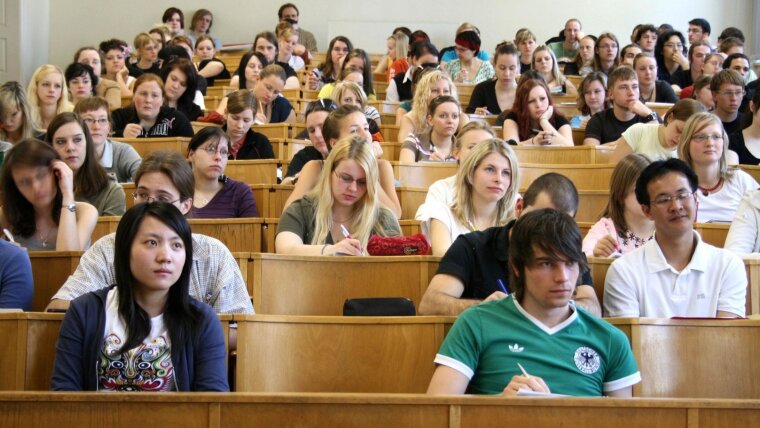
Master Evolution, Ecology and Systematics
WS 2025/26
The colloquium is part of the MEES T1 module (students please register via Friedolin for the module and exam: MEES800 | Prf.Nr.: 335982 T1 - Projektmodul MEES: mündliche Leistungsnachweis Seminarbeitrag). To get the the credits, you need to attend 6 lectures.
The lectures take place fortnightly on Wednesdays from 2:15 p.m. to 3:45 p.m in the lecture hall Am Planetarium 1External link. All lectures will be given in English (unless otherwise noted).
| Date | Lecturer | Title |
| 22.10.2025 | Franziska Merle Willems (Universität Marburg) |
From pressed petals to present fields and forests: How climate and land use shape flowering time |
| 05.11.2025 | Andreas Schmidt-Rhaesa (Leibniz Institute for the Analysis of Biodiversity Change, Hamburg) | Priapulida - new data from an old phylum |
| 19.11.2025 | Rudolf Meier (Leibniz Institute for Evolution and Biodiversity Science, Museum für Naturkunde, Berlin) |
Digitally Native Species Discovery: Tackling Insect Diversity with Robots, Megabarcoding, and Artificial Intelligence |
| 03.12.2025 | Julia Bechteler (FSU Jena) | Tough performers - Biodiversity, evolution and ecology of drought and desiccation tolerant land plants |
| 17.12.2025 | Jana Wäldchen (MPI Biogeochemie Jena) | Flora Incognita: Automated plant identification meets citizen science |
| 14.01.2026 | Benoit Nabholz (University of Montpellier) | What Drives Genome Size Evolution in Animals? Transposable Elements, Genetic Drift, and Many Open Questions |
| 28.01.2026 | Marin Husemann (Staatliches Museum für Naturkunde Karlsruhe) | Evolution of band-winged grasshoppers: world-wide case studies |
WS 2024/25
Past colloquium talks for information.
| Date | Lecturer | Title |
| 23.10.2024 | Susanne Fritz (iDiv/ FSU Jena) | Biodiversity in the Anthropocene: macroecology and macroevolution of mammals and birds |
| 06.11.2024 | Natalie Iwanycki Ahlstrand (Natural History Museum of Denmark) | Collection-based research: Grass flowering times determined using herbarium specimens for modeling grass pollen under a warming climate |
| 20.11.2024 | Casey Dunn (Yale University) | Global genomics of the man-o’-war (Physalia) reveals biodiversity at the ocean surface |
| 04.12.2024 | Luis Wirsching (Natura2000-Station Mittleres Saaletal) | Managing neophytes in Thuringia |
| 18.12.2024 | Lutz Eckstein (Uni Karlstad, Sweden) | Species-rich road verges in Sweden: threats through invasive plants and prospects for biodiversity conservation |
| 15.01.2025 | Helmut Hillebrand (Oldenburg University) |
Biotic interactions, metacommunities and ecosystem functioning at the land-sea interface. Or: How I learned to embrace unexplained variances |
| 29.01.2025 | Viktora Dietrich (Freiburg University) |
Regeneration success of temperate tree species under increased nitrogen deposition levels and drought |
WS 2023/24
Past colloquium talks for information.
| Date | Lecturer | Title |
| 18.10.2023 | No colloquium | |
| 25.10.2023 | Ann Kathrin Huylmans (Mainz University) | Evolution of Sex Determination & Sex-Biased Gene Expression |
| 08.11.2023 | Anika Wohlleben (Clark University, Worcester, USA) | Eco-evolutionary dynamics in a host-parasite system |
| 22.11.2023 | Lennart Winckler (Dresden) | Sex-specific selection in different environments |
| 20.12.2023 | Meike Wittmann (Bielefeld University) | How do individual trait variation and the NC³ mechanisms (niche construction, niche conformance, niche choice) shape population dynamics and species interactions? |
| 10.01.2024 | Stephan Getzin (Uni Göttingen) | Studying the demography of a ring-forming grass in the Namib: a workflow using drone mapping, GIS, and spatial analyses |
| 24.01.2024 | Marti-March Salas (Frankfurt) | Threats and Processes Driving Cliff Ecosystems |
| 07.02.2024 | Thierry Dutoit (University of Avignon) | Restoring ecosystems by the use of nature based solutions: a sustainable answer to global changes? A Mediterranean case study in Southern-France |
WS 2022/23
Past colloquium talks for information.
| Date | Lecturer | Title |
| 02.11.2022 | No colloquium | |
| 16.11.2022 | Patrick Roberts (Jena) | From 'Green Deserts' to 'Forests of Plenty': An Emerging Archaeology of Tropical Forests |
| 30.11.2022 | Omer Nevo (iDiv) | The ecology and evolution of fruit traits |
| 14.12.2022 | Jana Eccard (Potsdam) | The timid invasion - Spatial behavioural sorting in an expanding rodent population |
| 04.01.2023 | Wolfgang Weisser (München) | Urban Ecology |
| 18.01.2023 | Michael Staab (Darmstadt) | Insects and their multi-trophic interactions in natural and experimental forests |
|
01.02.2023 |
Thierry Dutoit (Avignon) |
Restoring ecosystems by the use of nature based solutions: a sustainable answer to global changes? A Mediterranean case study in Southern-France |
|
08.02.2023 |
Harald Pauli (Vienna) |
The alpine life zone: Looking for plant refugia and extinction traps in the progressing Anthropocene |